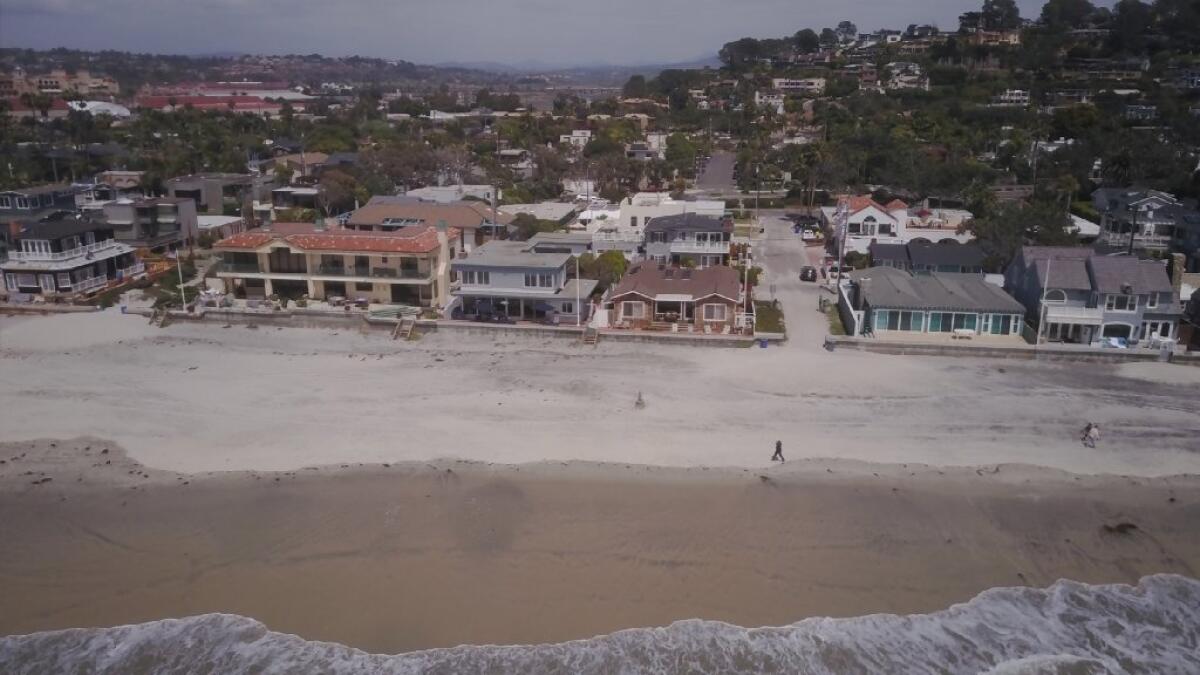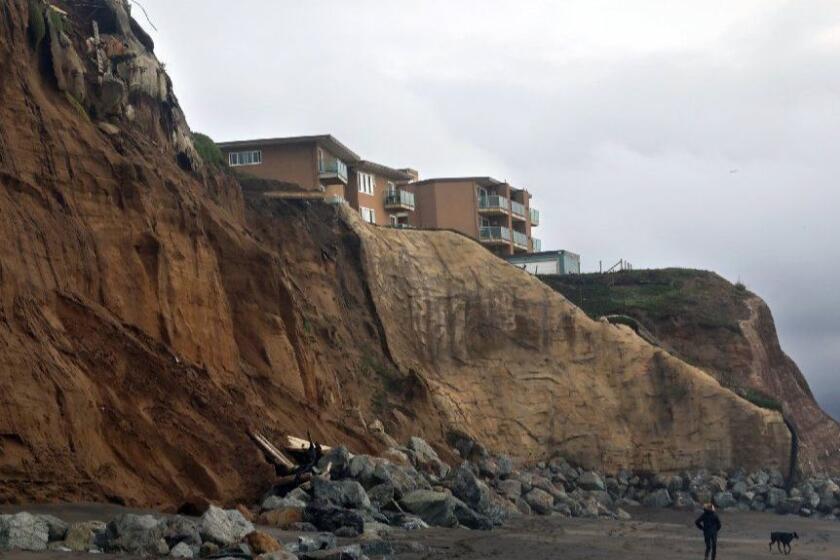California is feuding with this SoCal city over ‘planned retreat’ from sea level rise

- Share via
DEL MAR, Calif. — Del Mar is gearing up for a tussle with the California Coastal Commission over the best way to adapt to rising sea levels, an issue with statewide implications.
The city north of San Diego has taken the position that one of the Coastal Commission’s basic strategies, called “managed retreat” or sometimes “planned retreat,” will not work in Del Mar.
For the record:
3:47 p.m. Oct. 6, 2019A previous version of this story included an incorrect date for when the Coastal Commission will consider Del Mar’s plan. It is Oct. 16, not Oct. 27.
“We have a plan, and we stand by our plan,” Del Mar Councilman Dwight Worden said Friday.
The City Council is scheduled to review its sea level rise adaptation plan Monday in preparation for a Coastal Commission hearing on Oct. 16. The commission’s staff has recommended its board reject Del Mar’s plan unless the city agrees to a list of 25 modifications that Worden said could be a “back door” to managed retreat.
Del Mar is among the first cities or counties in the state to formalize its plans for adapting to sea level rise. As a result, Del Mar’s decisions and its negotiations with the Coastal Commission will set a precedent.
Managed retreat requires communities to look for ways to remove structures from low-lying land or seaside bluffs that are threatened by the rising sea. In some cases, public agencies would step in and buy private property, or facilitate a move in some other way so that nature can take its course.
Del Mar, after nearly five years of community meetings and work by residents, staffers and consultants, has agreed to reject the idea of managed retreat. Instead, the city intends to focus on restoring sand to eroding beaches, reinforcing its existing seawalls and dredging the channel of the nearby San Dieguito River.
“The extremely high land value in Del Mar means that public acquisition of any property the city does not control will be difficult and cost-prohibitive,” states a resolution approved last year by the City Council.
“Alternative locations are not available for displaced residents or city infrastructure,” it states. Instead, the city will pursue a combination of beach nourishment, sand retention and flood management projects.
Even as quakes, wildfires and drought have taken up most of our focus, the slow-moving disaster of rising seas has paralyzed Californians, and left us with “both too much and not enough time” to act, as environment reporter Rosanna Xia wrote in a special report examining sea level rise and the future of California’s disappearing coastline.
Planning for sea level rise is a relatively new requirement of the Coastal Commission. The state agency was founded in 1972 when there was little knowledge of climate change and rising sea levels.
Eventually, all coastal cities and counties will be required to include the adaptation plan in updates to their Local Coastal Programs, which are approved by the Coastal Commission so that local agencies can approve development without state oversight.
So far, the Coastal Commission has certified the adaptation plans only for the cities of San Francisco, San Clemente, Newport Beach and Santa Barbara and for the county of San Diego. Santa Barbara County and the city of Santa Monica have proposed plans to be considered by the commission in December.
Carlsbad completed a “sea level rise vulnerability assessment” two years ago that included its look at managed retreat. The city will hold a public review of its proposed Local Coastal Program update, including sea level adaptation strategies, on Oct. 29.
Managed retreat has been less of an issue in most other communities, where fewer residents live in low-lying coastal properties.
“We are at the tip of the spear because we chose to be at the tip of the spear,” said Worden, who was Del Mar’s city attorney for years before he was elected to the council. “There are some advantages to being first. We get to write the rules, or at least help write the rules.”
The Coastal Commission’s staff report says little about managed retreat and states that the city’s plan does a good job of addressing “near-term” strategies. But the report says Del Mar “fails to include the level of detail necessary to address the future impacts” of sea level rise.
Among the commission’s 25 suggested modifications are the inclusion of “triggers,” or specific thresholds that would require future updates of the city’s adaptation plan. Del Mar property owners have opposed triggers and said the plan needs to be flexible.
Other suggestions include better definitions of the areas at risk along the city’s coastal bluffs and on its flood plain.
The Coastal Commission has 12 voting members. They could approve any or all of their staff’s recommendations.
“Many of the requested changes directly conflict with the city’s adopted approach,” states a report prepared by Del Mar Principal Planner Amanda Lee.
“This includes items that were already considered and explicitly rejected at the local level during the development of the adaptation plan,” Lee states in the report. “The city is concerned that the required conditions will result in a variety of impacts (i.e. environmental, fiscal, and legal) that could be avoided by taking a more measured approach to adaptation per the ... pathway chosen by the city.”
In particular, the state’s approach would limit further development of areas already built and clearly designated by the city for residential and commercial purposes.
“Instead of taking into account the local context and particular nuances ... it appears that a ‘one size fits all’ approach is being tested on Del Mar,” the report states.
Diehl writes for the San Diego Union-Tribune.
More to Read
Sign up for Essential California
The most important California stories and recommendations in your inbox every morning.
You may occasionally receive promotional content from the Los Angeles Times.












